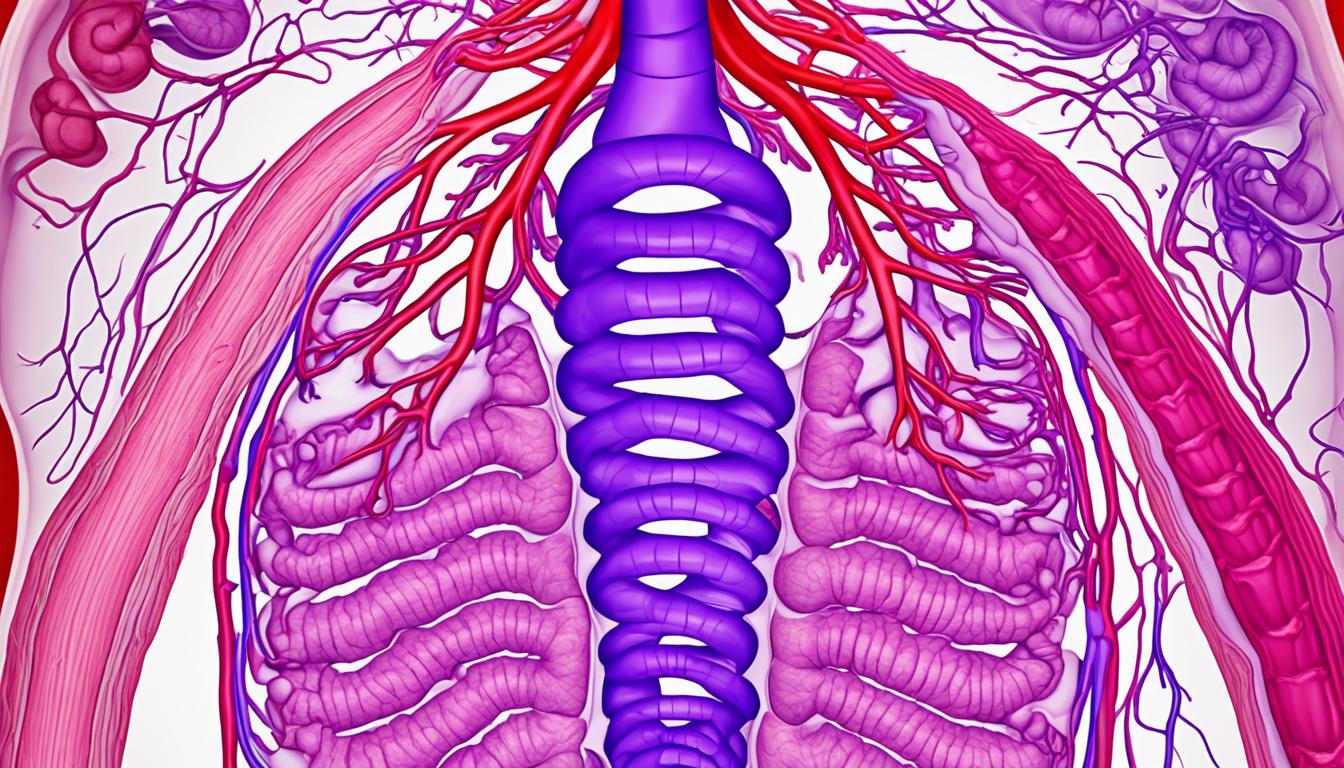Esophageal varices are issues in the lower esophagus. They’re from portal hypertension. Cirrhosis mostly causes them. This is when the liver thickens. It happens in 80-90% of cirrhotic patients. Other causes are clotting, portal vein clots, and parasites. Signs may include black stools, nausea, and liver disease symptoms.
Bleeding from esophageal varices is the worst issue. It can be deadly. To treat, doctors may use drugs, bands on the veins, or special procedures for severe cases. Stem cell therapy is new and might help avoid complications and better patient health.
Key Takeaways:
- Esophageal varices are abnormalities in the lower part of the esophagus caused by portal hypertension.
- Cirrhosis is the main cause of esophageal varices.
- Symptoms of esophageal varices include black stools, nausea, vomiting, dizziness, and signs of liver disease.
- Bleeding is the most dangerous complication and requires prompt treatment.
- Treatment options include medication, ligation, and stem cell therapy.
Diagnosing Esophageal Varices
Diagnosing esophageal varices uses various methods. The top choice is an upper endoscopy. This lets the doctor see the esophagus, stomach, and duodenum with a tube that has a camera. Doctors can spot enlarged veins and look for signs of bleeding.
Tests like abdominal CT scans and Doppler ultrasounds can hint at esophageal varices. Esophageal varices diagnosis may also include transient elastography. This ultrasound test checks for scarring and portal hypertension.
Capsule endoscopy is a less invasive way to find esophageal varices. A small camera is swallowed, taking pictures of the digestive tract. It provides detailed images of the esophagus and varices.
Summary of Diagnosing Methods:
| Diagnostic Method | Procedure | Advantages |
|---|---|---|
| Upper Endoscopy | Flexible tube with camera inserted through the mouth to visualize the esophagus, stomach, and duodenum | – Direct visualization of varices – Ability to measure variceal size – Detection of red streaks and spots |
| Imaging Tests | Abdominal CT scans and Doppler ultrasounds | – Indication of variceal presence – Assessment of portal hypertension |
| Capsule Endoscopy | Camera-containing capsule swallowed to capture images of the digestive tract | – Detailed visualization of the esophagus – Assessment of variceal severity |
These methods help doctors diagnose esophageal varices accurately. They are crucial for deciding the best treatment.
Treating Esophageal Varices
Esophageal varices are treated to avoid dangerous bleeding. Many treatments exist, chosen per the patient’s needs and the issue’s severity.
Medications
Beta blockers are often given to lower blood pressure in the portal vein. This lessens the bleeding risk. They work by stopping certain hormones that dilate blood vessels and cut blood pressure. It’s crucial to check in often and adjust doses for the best effect.
Endoscopic Band Ligation
Endoscopic band ligation is a simple way to manage esophageal varices and prevent bleeding. A thin tube with a camera is inserted in your mouth to reach the esophagus. Elastic bands are placed on the varices to make them smaller and stop the bleed. This method works well and has few negative outcomes.
Transjugular Intrahepatic Portosystemic Shunt (TIPS)
For severe varices, a TIPS may help. It creates a connection from the portal vein to the hepatic vein with a stent. This lowers the portal vein pressure, cutting the bleeding risk. TIPS is done by a special radiologist and can help a lot for those with extreme liver issues and high portal vein pressure.
Other Treatment Options
Other options like applying pressure, giving blood to increase volume, and preventing infection after bleeding can also be used.
For some, a liver transplant might be needed, especially if bleeding happens a lot. This can solve esophageal varices in the long run by treating the main liver problem.
Working closely with your healthcare team is crucial if you have esophageal varices. Regular check-ups and sticking to your treatment plan can help avoid complications.
Conclusion
Esophageal varices are severe and can cause life-threatening issues if not treated fast. Cirrhosis, which scars the liver, is the main cause. But, other things like blood clotting problems and infections can also lead to varices.
It’s critical to find and treat esophageal varices early to avoid bleeding. People with this condition should closely work with their doctors. This helps manage it well and lowers the risks.
Treating esophageal varices involves using medicine to lower portal vein blood pressure. Endoscopic procedures help stop bleeding and prevent more issues. In severe situations, surgeries like TIPS or a liver transplant might be needed. Living healthy, avoiding alcohol, and eating well are also important for treatment.
To sum up, it’s vital to actively manage esophageal varices, follow medical advice, and get checked often. By doing this, people can live better and reduce the dangers of esophageal varices.

